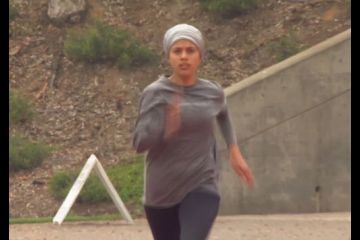International Olympic Committee (IOC) has announced that Saudi Arabia will send two female athletes to compete in the London 2012 Games.
Sarah Attar will compete in the 800 m and Wodjan Ali Seraj Abdulrahim Shahrkhani in the judo competition.
The Saudi authorities lifted a ban on women from the Gulf kingdom competing in the Games last month.
The public participation of women in sport is still fiercely opposed by many Saudi religious conservatives.
IOC President Jacques Rogge said it was “very positive news” and “an encouraging evolution”.
“I am pleased to see that our continued dialogue has come to fruition,” he said in a statement.

The IOC, keen to ensure “gender balance” at the Games, had been speaking to the Saudi Arabian Olympic Committee about the issue.
Speaking from her training base in the US, Sarah Attar said: “It’s such a huge honour and I hope that it can really make some big strides for women over there to get more involved in sport.”
The inclusion of the Saudi women means that, for the first time in the history of the Games, there will be a female entrant from every competing nation.
Female athletes from Qatar and Brunei are also due to attend for the first time.
Brunei’s Maziah Mahusin will complete in the athletics, while Qatar has entered athletes into the swimming (Nada Arkaji), athletics (Noor al-Malki), table tennis (Aya Magdy) and shooting (Bahiya al-Hamad).
Bahiya al-Hamad is also set to carry the Qatari flag at the opening ceremony, in what she said was a “truly historic moment”.
New York-based Human Rights Watch said the inclusion of Saudi women was a step forward.
“It’s an important precedent that will create space for women to get rights, and it will be hard for Saudi hardliners to roll back,” the organization’s Minky Worden said.
There is almost no public tradition of women participating in sport in Saudi Arabia, and officials have found it difficult to find athletes who could meet the minimum criteria for competing.
Officials have also said that female competitors will need to dress in such a way as “to preserve their dignity”.
This is likely to mean loose-fitting garments and a scarf covering the hair but not the face.
